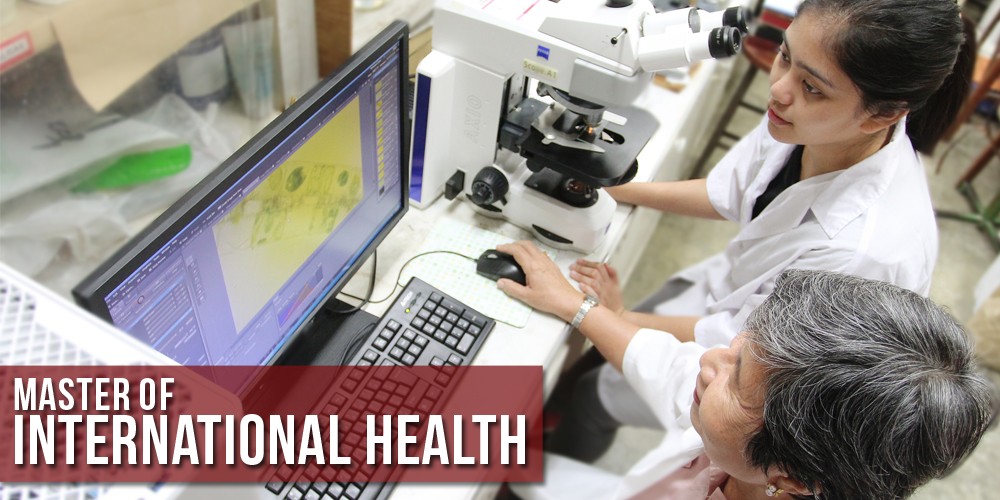
Master of International Health
Program Description
International health is a field focusing on public health across regional or national boundaries. It seeks to (a) understand health problems in a global context; (b) compare factors that affect the health of people in resource-poor and transitional economies around the world; and (c) develop means of disease reduction and health protection and promotion for these populations.
Prospective Students
The program is designed for:
- Medical and other professionals working in the field of health and development like nursing, dentistry, veterinary medicine, allied medical professions, social work and related fields;
- Entering and mid-career health professionals who are looking for graduate-level education and training that will prepare them for supervisory work in government health departments, local and international non-government organizations engaged in health and development work;
- Those who would like to pursue an academic career in international health; and
- Students with international and cross-cultural interests as they may apply their knowledge in an appropriate area of international health studies, while also developing a particular area of expertise.
Program Goals
The program aims to develop international health professionals who are able to:
- Design health programs that address significant global health problems and issues (e.g. pandemics, industrial accidents, disasters, health effects of environmental change) that are informed by a critical understanding of the global political, economic, environmental, and cultural systems and how these relate to health and development;
- Implement services that work in a global context for health promotion and development in accordance with international and local policies, directions, and ethical standards.
- Evaluate health development programs and strategies across different settings, both local and international, whether rural or urban, especially in middle- and low-resource countries;
- Engage in effective collaboration with important international organizations as well as non government organizations for the improvement of health, taking into account the interplay of political, economic, environmental, and cultural factors in different development settings especially in middle- and low-resource countries; and
- Contribute to the continuously evolving discipline of international health through research generation.
Admission Policies
The admission to the Master of International Health (MIH) is through the Diploma in International Health (DIH) program. A student who has completed the unit requirements (24 units) for the Diploma program may opt to proceed to the Master’s Program by taking up additional 12 units (one core course, one major course, and six units of thesis) upon complying with the admission requirements for MIH and passing the Qualifying Exam.
Program Policies
To stay in the program, a student must pass all courses and must not incur a grade of “5.0” in any of the courses taken. The retention policy of the UPOU will be observed and followed for this program.
Curriculum
The Master’s program consists of six units of thesis and 30 units of course work: four core courses (12 units), four major courses (12 units) in more focused health areas, and two cognate courses (6 units). (24 units of the course work are earned from the Diploma program)
Program of Study
Students are expected to take the courses in the following sequence.
| Year | First Semester | Number of Units | Second Semester | Number of Units |
|---|---|---|---|---|
| 1 | IH 201 | 3 units | IH 211 (HP) / IH 221(HSD) | 3 units |
| IH 202 | 3 units | IH 231 | 3 units | |
| BIOSTAT 201 | EPI 201 | |||
| 2 | IH 212 (HP) / IH 224 (HSD) | 3 units | IH 213 (HP) / IH 222 (HSD) | 3 units |
| IH 203 | 3 units | IH 243 | 3 units | |
| 3* | IH 204 | 3 units | IH 300 (Thesis) | 3 units |
| IH 214 (HP) / IH 223 (HSD) | 3 units |
*Following the completion of DIH
For admission related details, please visit UPOU website.

















FMDS Socials